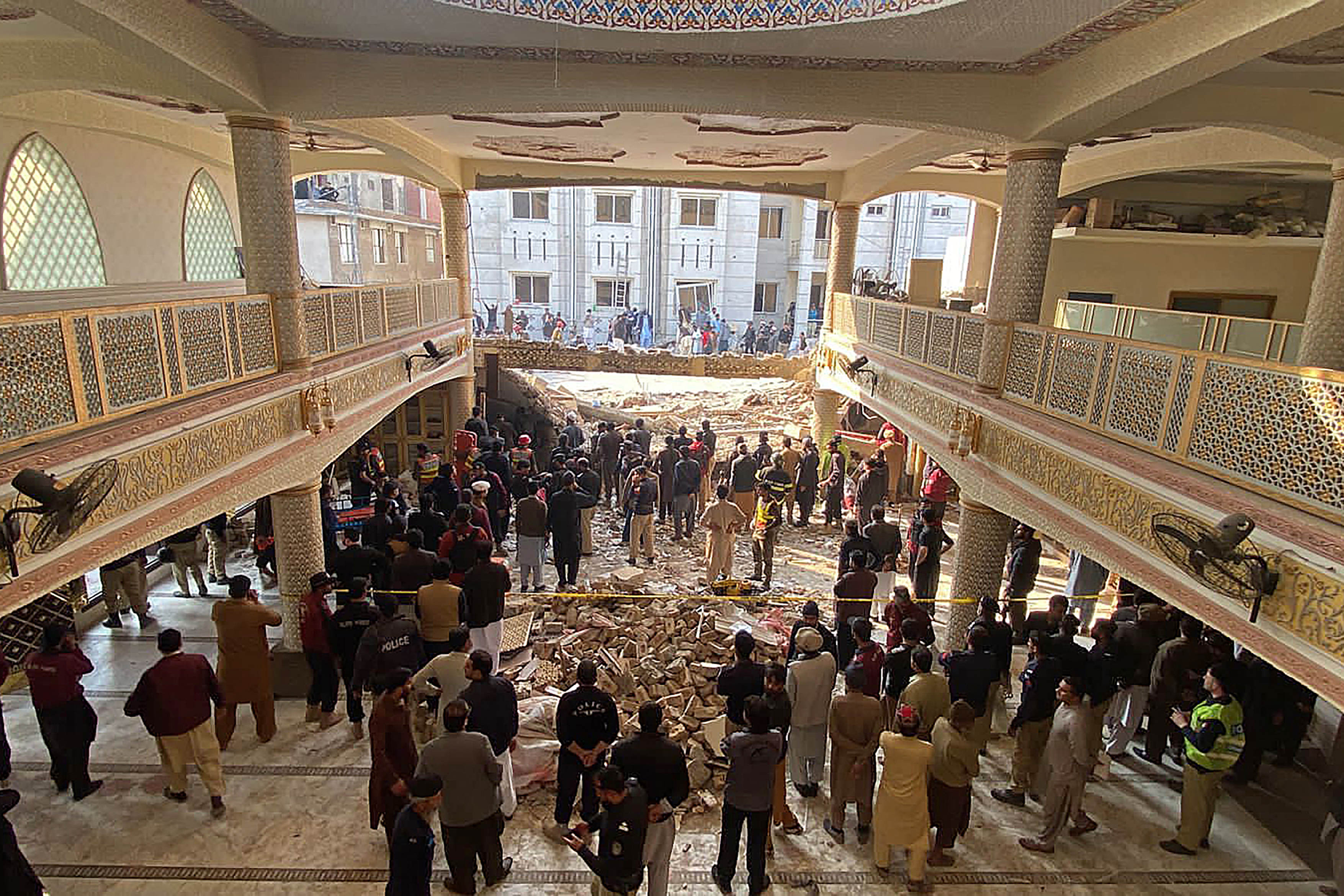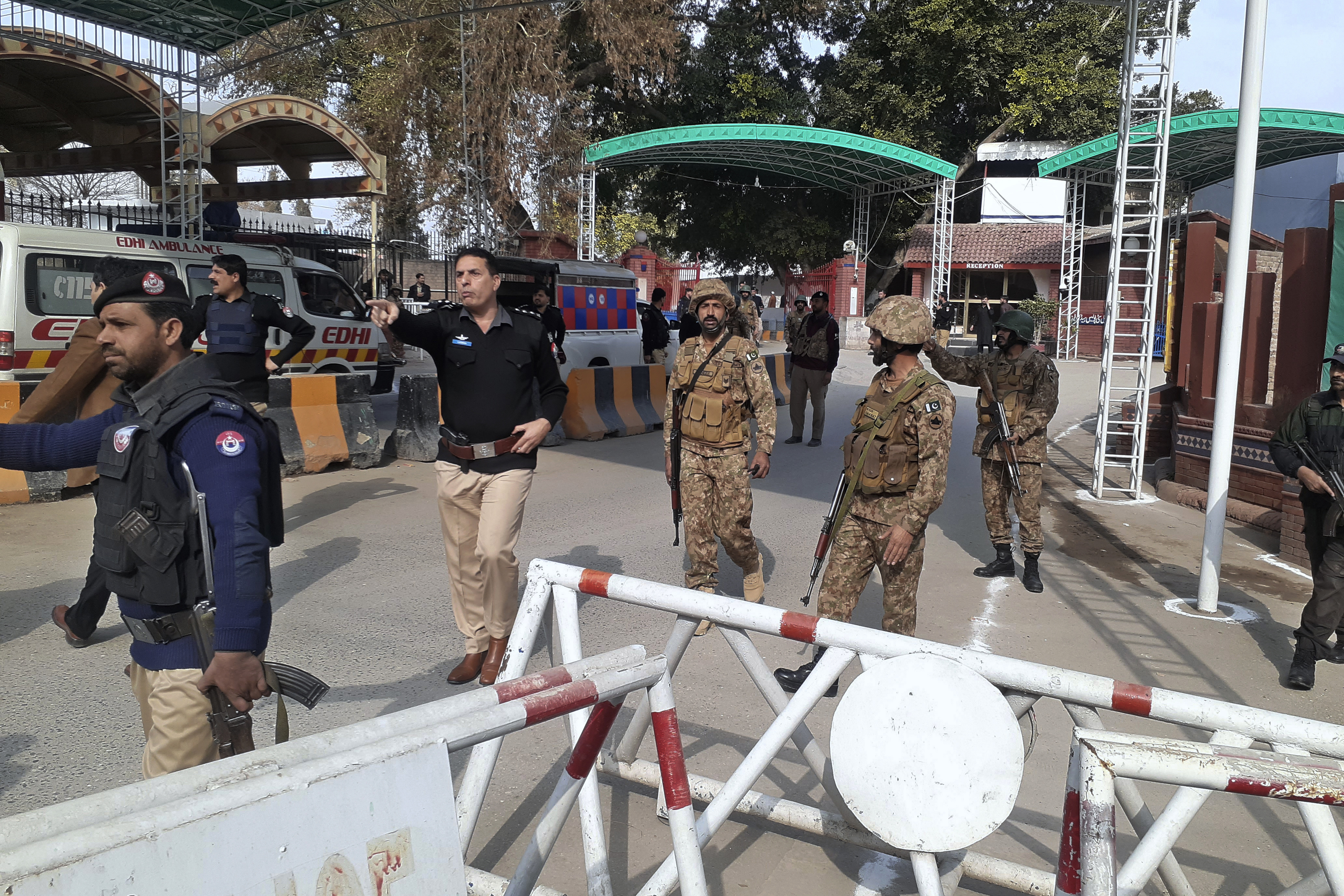
Dozens of people have been killed in a bomb attack targeting a mosque in a security compound in the northwestern Pakistani city of Peshawar, according to authorities.
Muhammed Asim, a spokesperson for the Lady Reading Hospital in Peshawar, told Al Jazeera on Tuesday that 92 people had died.
He said that, out of the more than 170 injured people taken to hospital, 52 injured people were still receiving treatment and six remained in critical condition.
Siddique Khan, a police official, said the attacker blew himself up while among the worshippers. Authorities said more than 90 percent of the casualties were police officials.
Sarbakaf Mohmand, a commander for the Pakistan Taliban (Tehreek-e-Taliban, or TTP), initially claimed responsibility for the attack on Twitter.
But hours later, TTP spokesperson Mohammad Khurasani distanced the group from the bombing, saying it was not its policy to target mosques, seminaries and religious places. His did not address why a TTP commander had claimed responsibility for the bombing.
“Tehreek-e-Taliban has nothing to do with this attack,” a TTP statement said.
The mosque is located inside a highly fortified compound that includes the headquarters of the provincial police force and a counterterrorism department.
Authorities said part of the building collapsed and that many people were feared to be trapped under the rubble.
Peshawar’s Police Chief Muhammad Ijaz Khan said in a televised statement that the capacity of the main hall of the mosque was nearly 300 and it was “nearly full” at the time of the explosion.
At least 17 people have reportedly been killed and dozens injured after a bomb blast at a busy mosque in Pakistan's Peshawar, say local officials ⤵️
🔗: https://t.co/R5q74scIjW pic.twitter.com/YWynAHGu00
— Al Jazeera English (@AJEnglish) January 30, 2023
The mosque is within Peshawar’s Police Lines, an area that is part of the city’s red zone where a number of important government installations are, including the Chief Minister House, Governor House, and the Khyber Pakhtunkhwa provincial assembly building.
Al Jazeera’s Kamal Hyder, reporting from Islamabad, said that “the suicide bomber [was reportedly] sitting in the front row of the congregational prayers inside the mosque”.
Shahid Ali, a policeman who survived the attack, said the explosion took place seconds after the prayers started.
“I saw black smoke rising to the sky. I ran out to save my life,” the 47-year-old told the AFP news agency.
“The screams of the people are still echoing in my mind,” he added. “People were screaming for help.”
Prime Minister Shehbaz Sharif condemned the bombing as an “attack on Pakistan”. He promised “stern action” against those behind the attack.
While the pain of the grieving families cannot be described in words, I express my heartfelt condolences & most sincere sympathies. My message to the perpetrators of today's despicable incident is that you can't underestimate the resolve of our people. https://t.co/edUJ6SbP3M
— Shehbaz Sharif (@CMShehbaz) January 30, 2023
Former Pakistan Prime Minister Imran Khan took to Twitter to denounce the bombing.
“Strongly condemn the terrorist suicide attack in police lines mosque Peshawar during prayers,” he tweeted.
“It is imperative we improve our intelligence gathering and properly equip our police forces to combat the growing threat of terrorism.”
Peshawar, the capital of the Khyber Pakhtunkhwa province bordering Afghanistan, has experienced frequent attacks.
Last March, a suicide bomber targeted a mosque there, killing 64 in what was Pakistan’s deadliest attack since 2018. The Islamic State in Khorasan Province, ISKP (ISIS-K) claimed responsibility for the bombing.

Pakistan has seen a surge in violence during the last year, with numerous attacks on law enforcement officials, particularly in Khyber Pakhtunkhwa as well as the southern province of Balochistan.
In November last year, the TTP, which has been waging a rebellion against Pakistan for more than a decade, unilaterally ended a ceasefire with the Pakistani state.
In 2022 alone, Pakistan’s monitoring agencies recorded more than 150 attacks launched by the TTP – a group ideologically aligned with the Afghan Taliban – that struck across the country and killed dozens of people.
Authorities fear the return to power of the Taliban in Afghanistan has emboldened the TTP and led to its resurgence.
The group demands the imposition of their hardline interpretation of Islamic law, the release of members arrested by the government, and a reversal of the merger of Pakistan’s tribal areas with Khyber Pakhtunkhwa province.
Al Jazeera’s Abid Hussain contributed reporting from Islamabad, Pakistan.







